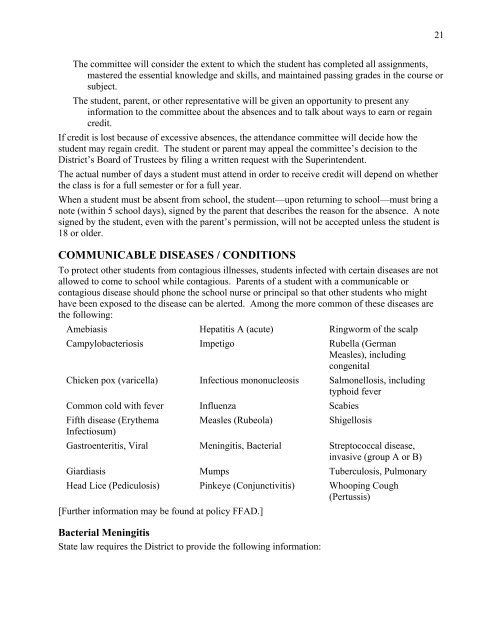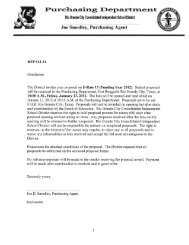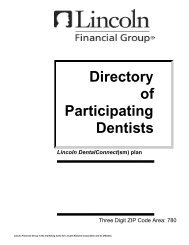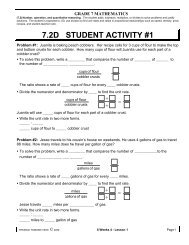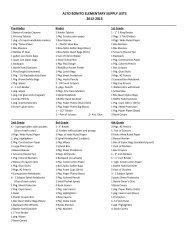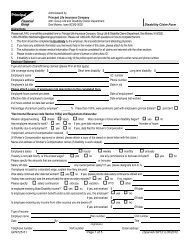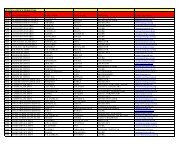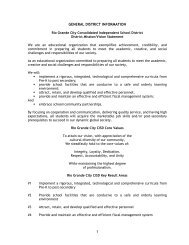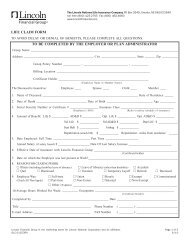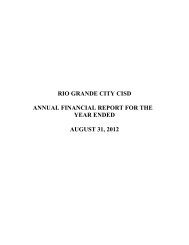21The committee will consider the extent to which the student has completed all assignments,mastered the essential knowledge and skills, and maintained passing grades in the course orsubject.The student, parent, or other representative will be given an opportunity to present anyinformation to the committee about the absences and to talk about ways to earn or regaincredit.If credit is lost because of excessive absences, the attendance committee will decide how thestudent may regain credit. The student or parent may appeal the committee’s decision to theDistrict’s Board of Trustees by filing a written request with the Superintendent.The actual number of days a student must attend in order to receive credit will depend on whetherthe class is for a full semester or for a full year.When a student must be absent from school, the student—upon returning to school—must bring anote (within 5 school days), signed by the parent that describes the reason for the absence. A notesigned by the student, even with the parent’s permission, will not be accepted unless the student is18 or older.COMMUNICABLE DISEASES / CONDITIONSTo protect other students from contagious illnesses, students infected with certain diseases are notallowed to come to school while contagious. Parents of a student with a communicable orcontagious disease should phone the school nurse or principal so that other students who mighthave been exposed to the disease can be alerted. Among the more common of these diseases arethe following:Amebiasis Hepatitis A (acute) Ringworm of the scalpCampylobacteriosis Impetigo Rubella (GermanMeasles), includingcongenitalChicken pox (varicella) Infectious mononucleosis Salmonellosis, includingtyphoid feverCommon cold with fever Influenza ScabiesFifth disease (Erythema Measles (Rubeola)ShigellosisInfectiosum)Gastroenteritis, Viral Meningitis, Bacterial Streptococcal disease,invasive (group A or B)Giardiasis Mumps Tuberculosis, PulmonaryHead Lice (Pediculosis) Pinkeye (Conjunctivitis) Whooping Cough(Pertussis)[Further information may be found at policy FFAD.]Bacterial MeningitisState law requires the District to provide the following information:
22WHAT IS MENINGITIS?Meningitis is an inflammation of the covering of the brain and spinal cord. It can be caused byviruses, parasites, fungi, and bacteria. Viral meningitis is most common and the least serious.Bacterial meningitis is the most common form of serious bacterial infection with the potential forserious, long-term complications. It is an uncommon disease, but requires urgent treatment withantibiotics to prevent permanent damage or death.WHAT ARE THE SYMPTOMS?Someone with meningitis will become very ill. The illness may develop over one or two days, butit can also rapidly progress in a matter of hours. Not everyone with meningitis will have the samesymptoms.Children (over 1 year old) and adults with meningitis may have a severe headache, hightemperature, vomiting, sensitivity to bright lights, neck stiffness or joint pains, and drowsiness orconfusion. In both children and adults, there may be a rash of tiny, red-purple spots. These canoccur anywhere on the body.The diagnosis of bacterial meningitis is based on a combination of symptoms and laboratoryresults.HOW SERIOUS IS BACTERIAL MENINGITIS?If it is diagnosed early and treated promptly, the majority of people make a complete recovery. Insome cases it can be fatal or a person may be left with a permanent disability.HOW IS BACTERIAL MENINGITIS SPREAD?Fortunately, none of the bacteria that cause meningitis are as contagious as diseases like thecommon cold or the flu, and they are not spread by casual contact or by simply breathing the airwhere a person with meningitis has been. The germs live naturally in the back of our noses andthroats, but they do not live for long outside the body. They are spread when people exchangesaliva (such as by kissing; sharing drinking containers, utensils, or cigarettes).The germ does not cause meningitis in most people. Instead, most people become carriers of thegerm for days, weeks, or even months. The bacteria rarely overcome the body’s immune systemand causes meningitis or another serious illness.HOW CAN BACTERIAL MENINGITIS BE PREVENTED?Do not share food, drinks, utensils, toothbrushes, or cigarettes. Limit the number of persons youkiss.While there are vaccines for some other strains of bacterial meningitis, they are used only inspecial circumstances. These include when there is a disease outbreak in a community or forpeople traveling to a country where there is a high risk of getting the disease. Also, a vaccine isrecommended by some groups for college students, particularly freshmen living in dorms orresidence halls. The vaccine is safe and effective (85–90 percent). It can cause mild side effects,such as redness and pain at the injection site lasting up to two days. Immunity develops withinseven to ten days after the vaccine is given and lasts for up to five years.WHAT SHOULD YOU DO IF YOU THINK YOU OR A FRIEND MIGHT HAVE BACTERIALMENINGITIS?You should seek prompt medical attention.


